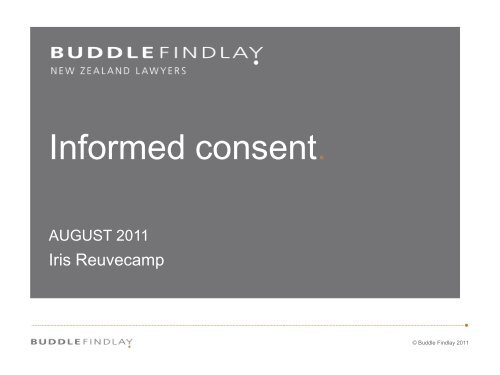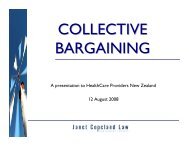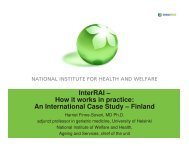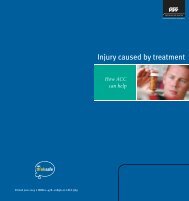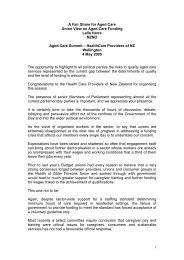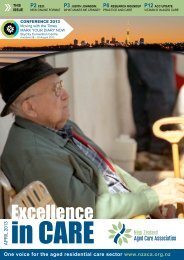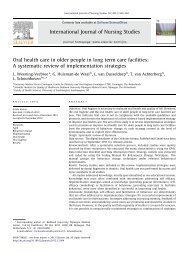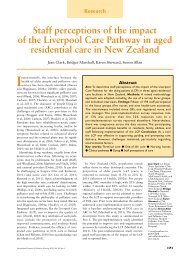DNR, EPOA and informed consent - New Zealand Aged Care ...
DNR, EPOA and informed consent - New Zealand Aged Care ...
DNR, EPOA and informed consent - New Zealand Aged Care ...
You also want an ePaper? Increase the reach of your titles
YUMPU automatically turns print PDFs into web optimized ePapers that Google loves.
Informed <strong>consent</strong>.<br />
AUGUST 2011<br />
Iris Reuvecamp<br />
© Buddle Findlay 2011
Overview<br />
• Key principles of <strong>informed</strong> <strong>consent</strong><br />
• What happens when a person is no longer able to<br />
<strong>consent</strong><br />
– Emergency Situations<br />
– Advance Directives<br />
– Medically Initiated Not for CPR orders<br />
– Court Orders<br />
– Enduring Powers of Attorney/Welfare Guardians<br />
– Right 7(4)<br />
© Buddle Findlay 2011
The law relating to <strong>consent</strong> in NZ<br />
• Code of Health <strong>and</strong> Disability Services Consumers'<br />
Rights (“Code of Rights”)<br />
• Common Law<br />
• NZ Bill of Rights Act<br />
• Crimes Act<br />
© Buddle Findlay 2011
Key principle<br />
“Every human being of adult years <strong>and</strong> sound mind has a<br />
right to determine what shall be done with his own body”<br />
(Schloendorff v Society of <strong>New</strong> York<br />
Hospital 105 NE 92 (NY, 1914), p93)<br />
© Buddle Findlay 2011
Code of Rights<br />
• A major source of the law on<br />
<strong>informed</strong> <strong>consent</strong> in NZ:<br />
– Right 5 – Right to effective<br />
communication<br />
– Right 6 – Right to be fully <strong>informed</strong><br />
– Right 7 – Right to make an <strong>informed</strong><br />
choice <strong>and</strong> give <strong>informed</strong> <strong>consent</strong><br />
• By law, all providers must comply<br />
with the rights set out in the Code of<br />
Rights when providing health <strong>and</strong><br />
disability services<br />
© Buddle Findlay 2011
Common Law<br />
“An individual patient must, in my view, always retain the<br />
right to decline operative investigation or treatment<br />
however unreasonable or foolish this may appear in the<br />
eyes of his medical advisers”<br />
(SMITH V AUCKLAND HOSPITAL BOARD<br />
[1965] NZLR 191 (CA), P219, PER T<br />
A GRESSON J)<br />
© Buddle Findlay 2011
<strong>New</strong> Zeal<strong>and</strong> Bill of Rights Act<br />
• Section 10 – “Every person has the right not to be<br />
subjected to medical or scientific experimentation<br />
without that person’s <strong>consent</strong>”<br />
• Section 11 – “Everyone has the right to refuse to<br />
undergo any medical treatment”<br />
© Buddle Findlay 2011
Crimes Act<br />
• Assault – “means the act of intentionally applying or<br />
attempting to apply force to the person of another,<br />
directly or indirectly....”<br />
• Unless there is a lawful excuse – e.g. <strong>consent</strong> or<br />
other lawful basis for proceeding in the absence of<br />
<strong>consent</strong><br />
© Buddle Findlay 2011
What obtaining <strong>informed</strong> <strong>consent</strong> means in practice<br />
• A competent person…<br />
• Making a voluntary choice…<br />
• About information communicated effectively…<br />
• Which is sufficient to make an <strong>informed</strong> decision<br />
© Buddle Findlay 2011
When a person can no longer <strong>consent</strong><br />
• Emergency Situations<br />
• Advance Directives<br />
• Medically initiated Not for CPR orders<br />
• Enduring Powers of Attorney/Welfare Guardians<br />
• Court Orders<br />
• Right 7(4)<br />
© Buddle Findlay 2011
Emergency situations<br />
© Buddle Findlay 2011
Emergency situations<br />
• Treatment can be provided in an<br />
emergency<br />
• Must be necessary to preserve life, health<br />
<strong>and</strong> well being <strong>and</strong> is in the best interests<br />
of a person<br />
• However:<br />
– Treatment will not be justified if it is contrary to<br />
the known wishes of a competent person<br />
– The treatment must not be inconsistent with a<br />
valid Advance Directive given by a person<br />
– The treatment must be, <strong>and</strong> be no more than,<br />
what a reasonable person would expect to<br />
receive in all the circumstances<br />
© Buddle Findlay 2011
Advance Directives<br />
© Buddle Findlay 2011
Advance decisions regarding CPR<br />
• By resident/patient - Advance Directive<br />
– Individual autonomy <strong>and</strong> right to refuse<br />
services/treatment<br />
– Still valid even if medically appropriate to attempt<br />
resuscitation<br />
– In effect this is a “patient initiated Not For CPR order”<br />
• By doctor – Not For CPR Order<br />
– In the course of treatment planning<br />
– Ideally following discussion with patient <strong>and</strong>/or family<br />
– CPR deemed clinically inappropriate<br />
© Buddle Findlay 2011
Advance directives<br />
• Everyone has the right to use<br />
an advance directive in<br />
accordance with the common<br />
law (Right 7(5) of the Code of<br />
Rights)<br />
• “Advance directive” means a<br />
written or oral directive by<br />
which a person makes a choice<br />
about a possible future health<br />
care procedure that is intended<br />
to be effective only when he or<br />
she is not competent<br />
© Buddle Findlay 2011
Advance directives<br />
• An advance directive will be valid if the patient:<br />
– was competent to make the advance directive at<br />
the time it was made;<br />
– made the advance free from undue influence;<br />
– was sufficiently <strong>informed</strong> at the time the advance<br />
directive was made; <strong>and</strong><br />
– intended the advance directive to apply in the<br />
current circumstances<br />
© Buddle Findlay 2011
Advance directives – common examples<br />
© Buddle Findlay 2011
Advance directives – common examples<br />
© Buddle Findlay 2011
Advance directives<br />
• Law on advance directives<br />
still relatively untested in NZ<br />
• Need to be sure about<br />
circumstances in which<br />
advance directive was<br />
provided where a patient<br />
is refusing treatment<br />
• If no concerns about validity<br />
of advance directive,<br />
must comply<br />
© Buddle Findlay 2011
Gr<strong>and</strong>mother's chest tattoo makes wishes clear<br />
• "I wanted to add 'If you do I will<br />
sue' at the bottom of it, but you<br />
have to stop at some point"<br />
• St John's Southern Region<br />
operations manager Doug Third<br />
said a tattoo saying "Do not<br />
resuscitate" would not stop him<br />
from saving a life.<br />
• "I would hesitate for a second<br />
but I would still do my job"<br />
(Otago Daily Times)<br />
© Buddle Findlay 2011
Medically Initiated Not for CPR orders<br />
© Buddle Findlay 2011
Medically initiated Not for CPR orders<br />
• Medical decision not to attempt CPR in the event of a<br />
cardiac arrest<br />
• CPR not clinically indicated or appropriate<br />
• Ideally follows discussion with patient <strong>and</strong>/or family<br />
• Is part of the patient’s future treatment plan<br />
• Does not require the patient’s <strong>consent</strong><br />
© Buddle Findlay 2011
Health <strong>and</strong> Disability Commissioner<br />
• Helpful to have different st<strong>and</strong>ard forms for Advance<br />
Directives by consumers regarding resuscitation, <strong>and</strong><br />
Do Not Resuscitate Orders put in place by clinicians as<br />
part of the treatment plan<br />
• Health practitioners are NOT required to provide CPR<br />
where it is not clinically indicated or appropriate<br />
• A st<strong>and</strong>ard policy to attempt CPR on ALL<br />
residents/patients may not be good medical or legal<br />
practice<br />
“not for the good that it will do, but that nothing may be left undone on<br />
the margin of the impossible” (T S ELLIOT)<br />
(NZ Resuscitation Council Consultation Meeting, 6 April 2009)<br />
© Buddle Findlay 2011
Can family <strong>consent</strong> on an incompetent adult's behalf?<br />
• Being someone's next of kin does not give you any<br />
specific legal rights when that person is alive<br />
• A family member CANNOT <strong>consent</strong> on a person’s<br />
behalf unless they hold an Enduring Power of Attorney<br />
in relation to personal care <strong>and</strong> welfare or have been<br />
appointed a Welfare Guardian<br />
© Buddle Findlay 2011
Orders <strong>and</strong> powers under the PPPR Act<br />
• The Act allows a competent person to give an<br />
“enduring power of attorney” to another person in<br />
relation to personal care <strong>and</strong> welfare <strong>and</strong>/or property<br />
matters<br />
• The PPPR Act provides for a court to:<br />
– appoint a Welfare Guardian<br />
– make personal order(s) that deal with the care <strong>and</strong><br />
welfare of the person in question<br />
• A court may also make a personal order for the<br />
administration of property or appoint a property<br />
manager<br />
© Buddle Findlay 2011
What is an Enduring Power of Attorney?<br />
• The purpose of a power of attorney is to enable a<br />
person to grant someone else the power to act on their<br />
behalf in relation to their property <strong>and</strong>/or their personal<br />
welfare<br />
• Difference between a "power of attorney" <strong>and</strong> an<br />
"enduring power of attorney" ("<strong>EPOA</strong>")<br />
• The prime characteristic of an <strong>EPOA</strong> is that it<br />
continues to have effect after the donor becomes<br />
mentally incapable<br />
© Buddle Findlay 2011
Creation of an <strong>EPOA</strong><br />
• An <strong>EPOA</strong> must be in the prescribed form<br />
• Must be signed by the donor <strong>and</strong> the attorney<br />
• Signatures must be witnessed by an independent<br />
lawyer, legal executive, or employee of a trustee<br />
corporation<br />
• The witness to the donor's signature must complete a<br />
certificate confirming that:<br />
– they have explained the effect of the <strong>EPOA</strong><br />
– there is no reason to suspect incapacity of the donor<br />
– they are independent<br />
© Buddle Findlay 2011
<strong>EPOA</strong> - Property<br />
• May cover part or whole of property<br />
• Donor may impose conditions<br />
• Depending upon donor’s instructions may be<br />
effective while donor has capacity, or upon<br />
incapacity<br />
© Buddle Findlay 2011
<strong>EPOA</strong> – Personal <strong>Care</strong> <strong>and</strong> Welfare<br />
• Donor may appoint one attorney to act in a general or<br />
specific manner in respect of personal care <strong>and</strong><br />
welfare<br />
• The donor may impose certain conditions <strong>and</strong><br />
restrictions<br />
• Only effective upon incapacity<br />
• Attorney must not act on a "significant matter" unless a<br />
"relevant health practitioner" has certified (or the Court<br />
has determined) that the donor is mentally incapable<br />
• Certificate must be in the prescribed form<br />
© Buddle Findlay 2011
Duties of an <strong>EPOA</strong> for care <strong>and</strong> welfare<br />
• Obligation to act in the donor's best interests<br />
• Specific duties include a duty to:<br />
– encourage donor's independence<br />
– re-integrate into the community as much as possible<br />
– consider donor's $ situation when making decisions<br />
– consult donor <strong>and</strong> any persons identified in the <strong>EPOA</strong><br />
– provide information on request of listed person<br />
– consult with property attorney (mutual)<br />
• May have regard to donor's advance directive but<br />
attorney's powers subject to (statutory) limitations<br />
© Buddle Findlay 2011
Limits on <strong>EPOA</strong> for care <strong>and</strong> welfare<br />
• An <strong>EPOA</strong> for personal care <strong>and</strong> welfare has NO<br />
power to:<br />
– Make decisions about entering marriage or divorce<br />
– Make decisions about adoption of donor's child<br />
– Refuse <strong>consent</strong> to st<strong>and</strong>ard medical treatment to<br />
save life or prevent serious damage to health<br />
– Consent to ECT<br />
– Consent to surgery which destroys any part of the<br />
brain or brain function for the purpose of changing<br />
the person’s behaviour<br />
– Consent to experimental treatment<br />
• Same limits apply to welfare guardians<br />
© Buddle Findlay 2011
Welfare Guardians<br />
• Effectively the same as an <strong>EPOA</strong> for care <strong>and</strong> welfare,<br />
but court appointed<br />
• Before appointing a welfare guardian the Court must<br />
be satisfied that:<br />
– The person wholly lacks capacity to make or<br />
communicate decisions relating to any particular<br />
aspect(s) of their personal care <strong>and</strong> welfare; <strong>and</strong><br />
– Such an appointment is the only satisfactory way to<br />
ensure the appropriate decisions are made<br />
• Statutory limitations apply (same as <strong>EPOA</strong>)<br />
© Buddle Findlay 2011
Provision of services<br />
• "Consumer" in the Code of Rights means a health<br />
consumer or a disability services consumer<br />
<strong>and</strong><br />
• Includes a person entitled to give <strong>consent</strong> on behalf of<br />
that consumer for the purposes of:<br />
– Right 5 – Right to effective communication<br />
– Right 6 – Right to be fully <strong>informed</strong><br />
– Right 7(1) <strong>and</strong> 7(7) to (10) – Right to make an <strong>informed</strong><br />
choice <strong>and</strong> give <strong>informed</strong> <strong>consent</strong>, right to refuse or<br />
withdraw <strong>consent</strong> to services, removal of body parts<br />
– Right 10 – Right to complain<br />
© Buddle Findlay 2011
What this means in practice<br />
• The <strong>consent</strong> of the <strong>EPOA</strong> or WG must be obtained<br />
before carrying out any medical treatment on the<br />
person for whom the <strong>EPOA</strong> or WG is acting<br />
• The <strong>EPOA</strong> or WG:<br />
Must be kept <strong>informed</strong> about the person’s condition<br />
Must be involved in decisions about the person’s<br />
care<br />
Is entitled to the information the person themselves<br />
would require to make an <strong>informed</strong> decision<br />
© Buddle Findlay 2011
What this means in practice<br />
• The <strong>EPOA</strong> or WG:<br />
Must be given accurate answers to questions about<br />
the person’s care <strong>and</strong> condition<br />
May refuse services <strong>and</strong> withdraw <strong>consent</strong> (subject<br />
to the statutory limitations)<br />
• The <strong>EPOA</strong> or WG can only <strong>consent</strong> to treatment that<br />
falls within the ambit of the empowering document<br />
© Buddle Findlay 2011
What this means in practice<br />
• A decision by an <strong>EPOA</strong> or WG has the same effect as<br />
if it had been made by the person themselves<br />
• The person for whom the <strong>EPOA</strong> or WG is acting does<br />
not have to agree<br />
• Do not have to inquire into whether the person, or any<br />
other person, concurs with the decision<br />
• Consent not affected by notice that the person or any<br />
other person does not agree with the decision<br />
© Buddle Findlay 2011
Responsibilities when providing care<br />
• Staff should always check the document<br />
empowering the <strong>EPOA</strong> or WG<br />
• If in any doubt seek advice<br />
• A copy of the document <strong>and</strong> any certificate of mental<br />
incapacity must be filed in the person’s clinical record<br />
• Document the <strong>consent</strong> process as in the same way<br />
as if the patient was making the decision themselves<br />
© Buddle Findlay 2011
Responsibilities when providing care<br />
• Remember - <strong>EPOA</strong> only takes effect once a person<br />
becomes mentally incapable:<br />
– Still need to assess competence of a person to<br />
<strong>consent</strong> or refuse medical treatment on own behalf<br />
– Significant matter? Need certification of incapacity<br />
before <strong>EPOA</strong> can act<br />
– <strong>EPOA</strong> ceases to be operative if the person regains<br />
capacity<br />
– Right 7(3) - a person with diminished competence<br />
retains the right to make an <strong>informed</strong> choice <strong>and</strong><br />
give <strong>informed</strong> <strong>consent</strong> to extent appropriate to his or<br />
her level of competence<br />
© Buddle Findlay 2011
Case study – HDC 08HDC17105<br />
© Buddle Findlay 2011
Case study<br />
• A patient with dementia was being cared for in dementia<br />
unit. Over time, behavioural problems increased <strong>and</strong> the<br />
patient was unwilling to take medications, to shower or<br />
wash, <strong>and</strong> often refused routine cares<br />
• Two daughters were recorded as holding <strong>EPOA</strong>, allowing<br />
them to <strong>consent</strong> on patient's behalf if she was not<br />
competent to do so<br />
• In addition, all four sisters were actively involved in their<br />
mother’s care <strong>and</strong>, at times, expressed differing views on<br />
what should be done<br />
© Buddle Findlay 2011
Case study<br />
• Patient became aggressive <strong>and</strong> medical staff<br />
recommended a PRN medication regime to assist with<br />
personal cares<br />
• <strong>Care</strong> manager sought <strong>consent</strong> of <strong>EPOA</strong>s<br />
• One <strong>EPOA</strong> gave 'conditional' <strong>consent</strong> to medication<br />
regime<br />
• <strong>Care</strong> manager was aware of family's wishes to be<br />
consulted on proposed changes before decisions<br />
were made but took no steps to clarify the <strong>consent</strong><br />
© Buddle Findlay 2011
Case study<br />
• Family later requested a meeting to review medication:<br />
– Agreed to PRN medication provided family notified<br />
before use<br />
– A week later family requested medication be stopped<br />
because patient was 'drowsy'<br />
– <strong>Care</strong> manager told medical staff that family had<br />
'insisted' medication not be used<br />
– Family later stated had only wanted a lower dose<br />
used<br />
– Doctor increased dosage to manage patient<br />
• Family complained to HDC about <strong>consent</strong> to the<br />
medication regime<br />
© Buddle Findlay 2011
Case study<br />
Mrs A had dementia <strong>and</strong> her condition was clearly<br />
deteriorating. Informed <strong>consent</strong> was needed for her<br />
treatment plan, including the administration of<br />
medication but there was a lack of clarity about who<br />
was legally entitled to give <strong>consent</strong> on Mrs A's<br />
behalf when <strong>consent</strong> was needed.<br />
© Buddle Findlay 2011
Case study<br />
Conditional <strong>consent</strong> to medication regime insufficient:<br />
Mrs E advised that if the rest of the family disagreed<br />
she would abide by their decision…This is not<br />
adequate <strong>informed</strong> <strong>consent</strong> <strong>and</strong> there was a<br />
missed opportunity here to clarify the situation<br />
© Buddle Findlay 2011
Case study<br />
• The Deputy Commissioner noted that it was not<br />
unusual for family members to have different views<br />
• Rest homes <strong>and</strong> dementia units need to have clear<br />
strategies for dealing with this:<br />
Ideally there should be dialogue with all interested<br />
parties <strong>and</strong> a plan of treatment agreed, but in this<br />
case there was clear failure…to recognise where<br />
this was appropriate, <strong>and</strong> to properly manage the<br />
ongoing <strong>consent</strong> process, particularly once<br />
difficulties occurred…<br />
© Buddle Findlay 2011
Case study<br />
• The Deputy Commissioner noted that staff in the<br />
dementia unit:<br />
..should <strong>and</strong> must know the requirements of the<br />
PPPR Act. Staff should have communicated<br />
better with the family about requirements, such<br />
as the need to have only one <strong>EPOA</strong>, <strong>and</strong> that it<br />
was not appropriate to refuse st<strong>and</strong>ard<br />
medical treatment.<br />
© Buddle Findlay 2011
Case study<br />
• The Deputy Commissioner noted that:<br />
Rather than allowing the input from various family<br />
members to impede the provision of good care to<br />
Mrs A, [the care manager] should have sought<br />
<strong>consent</strong> from one <strong>EPOA</strong> alone. The <strong>EPOA</strong><br />
holder needed to be made aware that although<br />
they should be <strong>informed</strong> <strong>and</strong> consulted…they<br />
cannot refuse <strong>consent</strong> to st<strong>and</strong>ard medical<br />
treatment<br />
© Buddle Findlay 2011
Case study<br />
• The Deputy Commissioner also noted that the<br />
dementia unit:<br />
…could have sought the direction of the court<br />
under s102(2)(a) of the PPPR Act when Mrs A's<br />
daughters disagreed about the proposed<br />
treatment options, particularly as this conflict was<br />
affecting the provision of care.<br />
© Buddle Findlay 2011
Case study<br />
• The Deputy Commissioner found that:<br />
– The Facility Manager, <strong>Care</strong> Manager <strong>and</strong> rest<br />
home had breached the Code of Rights<br />
– The rest home was found vicariously liable for the<br />
managers’ breaches of the Code<br />
© Buddle Findlay 2011
Court orders<br />
© Buddle Findlay 2011
Personal Orders<br />
• Where a person wholly or partly lacks mental<br />
capacity to manage their affairs a court may make<br />
personal orders authorising certain actions or allowing<br />
others to manage those affairs, e.g:<br />
– Particular medical advice or treatment<br />
– Rehabilitative, therapeutic, or other services of a specified kind<br />
– Living arrangements specified in the order<br />
– That the person shall enter, attend at, or leave an institution<br />
specified in the order (but not a psychiatric hospital)<br />
– Appointing a welfare guardian to make decisions about the<br />
person’s care <strong>and</strong> welfare<br />
– To administer property<br />
© Buddle Findlay 2011
Personal Orders<br />
• Personal orders expire on the date specified in the<br />
order or after 12 months (sooner where the effect of<br />
the order is spent)<br />
• To assist in the implementation of a personal order a<br />
court may make further orders as are considered<br />
necessary<br />
© Buddle Findlay 2011
Orders in relation to property<br />
• Two types of property orders:<br />
– For smaller amounts of property – a court can<br />
make a personal order appointing a person to<br />
administer the property:<br />
Property must be worth no more than $5,000, or<br />
Income or benefit no more than $20,000 a year<br />
– For larger amounts of property – a court can<br />
make a property order appointing a Property<br />
Manager<br />
© Buddle Findlay 2011
Interim orders<br />
• The Court is able to make interim orders:<br />
– No more than six months for a personal order;<br />
– No more than three months for a property order<br />
• Interim order may be made if considered necessary<br />
pending final determination of the application (e.g.<br />
where urgent medical treatment is required)<br />
• There will be a hearing for an interim order if any of the<br />
parties involved requests it<br />
© Buddle Findlay 2011
Case study – HDC 08HDC20957<br />
© Buddle Findlay 2011
Case study<br />
• Ms A was a 43 year old woman with a complex personal<br />
history, which included severe psychological trauma,<br />
depression <strong>and</strong> alcohol abuse<br />
• She was admitted to hospital in May 2007 in a confused<br />
state <strong>and</strong> was assessed as not having the capacity to make<br />
decisions relating to her personal care <strong>and</strong> welfare <strong>and</strong><br />
therefore she could not give <strong>informed</strong> <strong>consent</strong><br />
• It was decided that an application should be made for a<br />
court order to place Ms A in an appropriate residential<br />
facility<br />
• The application was prepared but never filed with the Court<br />
© Buddle Findlay 2011
Case study<br />
• In August 2007, Ms A was discharged from hospital<br />
<strong>and</strong> placed at a secure rest home caring for older<br />
people with dementia<br />
• Ms A understood that she was legally required to live<br />
there<br />
• She was assessed three times over the following ten<br />
months, <strong>and</strong> on each occasion she expressed her<br />
wish to leave the home<br />
• Nearly a year after her admission, Ms A was assessed<br />
as being too well to be in a secure unit, <strong>and</strong><br />
competent in relation to her personal care <strong>and</strong> welfare<br />
© Buddle Findlay 2011
Case study<br />
• Staff discovered that there was no court order <strong>and</strong><br />
therefore no legal requirement for Ms A to remain at the<br />
home if she did not wish to be there<br />
• Ms A complained to HDC that she had been<br />
incarcerated in a secure rest home for more than a year<br />
without legal authority<br />
© Buddle Findlay 2011
Case study<br />
• The Commissioner reviewed the care provided by the<br />
DHB, the Trust involved in placing Ms A in the home,<br />
<strong>and</strong> the residential facility<br />
• The DHB acknowledged a breakdown in its processes<br />
<strong>and</strong> identified a number of contributing factors<br />
including:<br />
– The lack of a formal process to deal with PPPR Act<br />
application<br />
– Poor communication between its staff/teams<br />
– That no individual or team was responsible for<br />
coordinating the application<br />
© Buddle Findlay 2011
Case study<br />
• The DHB breached Rights 4(1) <strong>and</strong> 4(5) for:<br />
• Failing to have adequate systems in place to deal<br />
with the court order application – no follow up<br />
process<br />
• Failing to take sufficient or appropriate action in<br />
relation to Ms A's discharge<br />
• Poor communication <strong>and</strong> co-operation between staff<br />
<strong>and</strong> with other providers<br />
© Buddle Findlay 2011
Case study<br />
• The breakdown in the DHB's processes had significant<br />
<strong>and</strong> unacceptable consequences for the patient:<br />
…the challenges she faced made her particularly<br />
vulnerable. Those working with her needed to pay<br />
careful attention to her needs <strong>and</strong> to observing <strong>and</strong><br />
protecting her rights. This did not occur…she was<br />
seriously let down by health <strong>and</strong> disability services.<br />
© Buddle Findlay 2011
Case study<br />
• The Trust <strong>and</strong> the home breached Right 4(1) by:<br />
– Failing to verify Ms A's legal status<br />
– Failing to ascertain who could <strong>consent</strong> on her behalf<br />
<strong>and</strong> who it should consult <strong>and</strong> communicate with in<br />
relation to her residential placement<br />
…in order to establish a legal basis for it to provide services to Ms A<br />
[the Trust] needed to promptly obtain verification that a court order<br />
had been made <strong>and</strong> be aware of the conditions set out in the order.<br />
This could be done relatively simply by contacting the Family Court. A<br />
copy of the order needed to be on Ms A's file<br />
© Buddle Findlay 2011
Case study<br />
• The Commissioner noted:<br />
It is deeply disturbing that a provider of services for<br />
consumers where competence may be at issue, <strong>and</strong><br />
its staff, should apparently have so little<br />
underst<strong>and</strong>ing of the legal requirements<br />
© Buddle Findlay 2011
Case study<br />
• The Commissioner also noted:<br />
…What happened to Ms A should be a salutary<br />
lesson to all health <strong>and</strong> disability providers to be<br />
cognisant of the legal basis for providing services,<br />
<strong>and</strong> the associated responsibilities.<br />
• The Trust <strong>and</strong> the home were referred to the Director<br />
of Proceedings<br />
© Buddle Findlay 2011
Right 7(4) of the Code of Rights<br />
© Buddle Findlay 2011
Right 7(4) of the Code of Rights<br />
• A consumer who is not competent to<br />
make an <strong>informed</strong> choice<br />
AND<br />
there is no person entitled to <strong>consent</strong><br />
AND<br />
– Treatment is in best interests of<br />
the consumer; <strong>and</strong><br />
– Reasonable steps to ascertain<br />
consumer’s views; <strong>and</strong><br />
– Views of consumer or other<br />
suitable person taken into<br />
account<br />
© Buddle Findlay 2011
Questions?<br />
© Buddle Findlay 2011
© Buddle Findlay 2011


